To expand Medicaid or to not expand Medicaid? That’s still the question facing lawmakers in Kansas and 18 other states. Though the Legislature voted for expansion earlier this week, Gov. Sam Brownback promptly vetoed the measure. Legislators are expected to try to override the veto early next week, but they are likely to serve their constituents best if they exercise a bit of caution and don’t rush into making this final decision.
Proponents of expansion often argue that it can actually cut state Medicaid expenses because the federal government will pick up an even greater share of the program’s costs. However, this view is often very myopic.
The feds won’t pick up 100 percent of the expansion’s cost forever. As match rates begin to fall under the Affordable Care Act, Kansas would have to pick up an increasingly larger share of the expenses. A few years from now, this will leave legislators with a new budget dilemma: Will they hike taxes to cover the rapidly rising cost of Medicaid, or will they cover it by transferring funds from other areas of the budget such as education, roads or law enforcement?
A state already beset by major budget woes probably should not leap into a major expansion of any program — let alone one that will saddle taxpayers with such huge financial liabilities in the quite foreseeable future.
The Kansas Health Institute estimates expansion could cost Kansas an extra $729 million over the next seven years, with constantly rising costs thereafter. But experience elsewhere shows that enrollment greatly exceeds expectations. Enrollment projections were off by 90 percent in Illinois, 43 percent in North Dakota, 60 percent in Ohio and 134 percent in Kentucky. And when enrollment exceeds expectations, costs do as well.
Another issue for legislators to ponder is whether the federal government will repeal the Affordable Care Act. House leadership pulled its repeal bill last week, but it — or another repeal vehicle — could be reintroduced at any time. Any repeal effort is likely to contain Medicaid reforms that would drastically increase the costs shouldered by the states. For example, federal subsidies for the expansion population might be dramatically reduced. Would Kansas lawmakers then toss those people out of the program, or try to squeeze other programs to keep them on the Medicaid rolls?
With so much uncertainty over how many people would be covered, how much it would cost and how much the feds would actually kick in, it’s hard to see how legislators can make an informed decision about whether or not to expand Medicaid.
Expansion advocates claim that failure to expand Medicaid to include people who are not poor would leave them without care or at least deny them access to better health outcomes associated with insurance coverage. But the best research in this area doesn’t really support such claims. Research into the Oregon Medicaid expansion found that, while having Medicaid helped insulate recipients from unexpected financial burdens due to illness, it didn’t significantly improve their health outcomes. Additionally, the study found that anticipated cost savings – such as those to be derived from reduced usage of emergency rooms – never materialized. Indeed, after expansion, Oregon experienced a 40 percent increase in ER visits.
This goes to show that simply enrolling more people in Medicaid may give them coverage in name, but it does not mean that they will get appropriate, quality health care.
The likely costs and benefits of Medicaid expansion in Kansas are unknown. But, typically, expansion costs are grossly underestimated and benefits overestimated.
Only one thing is sure: Even if Obamacare remains the law of the land, the cost of Medicaid expansion to state taxpayers will grow into the future.
At this juncture, lawmakers would be wise to wait until there is more definitive information available concerning the risks and rewards of Medicaid expansion. The stakes for Kansas taxpayers are extremely high. They can’t afford to let legislators simply roll the dice and see what happens.
This piece originally appeared in Topeka Capital-Journal



